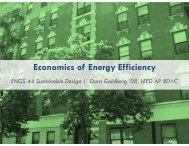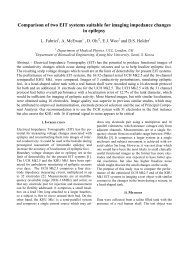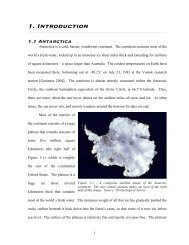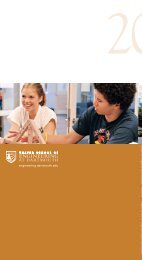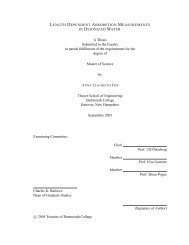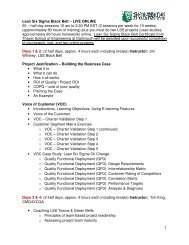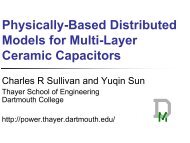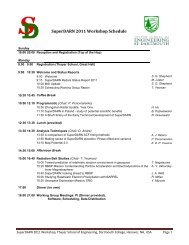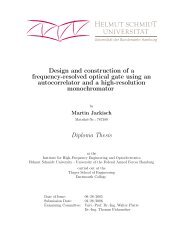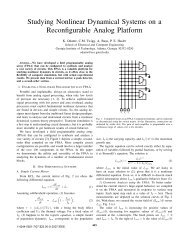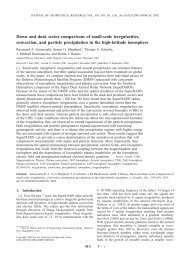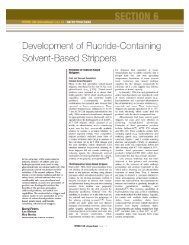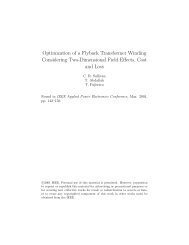Courses Programs - Thayer School of Engineering - Dartmouth ...
Courses Programs - Thayer School of Engineering - Dartmouth ...
Courses Programs - Thayer School of Engineering - Dartmouth ...
Create successful ePaper yourself
Turn your PDF publications into a flip-book with our unique Google optimized e-Paper software.
graduate courses<br />
ENGG 310 Advanced Topics in Signals and Systems<br />
(Cannot be used to satisfy any A.B. degree requirements)<br />
Offered: arrange<br />
Advanced study in signal processing and system theory. Possible topics include<br />
multi-input/multi-output systems, two-dimensional systems (image processing),<br />
modeling and identification, optimal filtering, and advanced optics. Readings in<br />
current research literature and student presentations.<br />
Prerequisites: Different for each topic; normally include ENGS 123 and ENGG 210 or<br />
equivalent, and permission <strong>of</strong> instructor<br />
Instructor: Hansen<br />
ENGG 312 Topics in Statistical Communication Theory<br />
(Cannot be used to satisfy any A.B. degree requirements)<br />
Offered: arrange<br />
Advanced study in any <strong>of</strong> the following or other topics may be pursued: information<br />
theory, coding, noise, random signals, extraction <strong>of</strong> signals from noise, pattern<br />
recognition, and modulation theory. Normally <strong>of</strong>fered in alternate years.<br />
Prerequisites: ENGS 93 (formerly 103), ENGS 110, and permission <strong>of</strong> instructor<br />
Instructor: Cybenko<br />
ENGG 317 Topics in Digital Computer Design<br />
(Cannot be used to satisfy any A.B. degree requirements)<br />
Offered: arrange<br />
Critical analysis <strong>of</strong> current literature in an emerging area <strong>of</strong> digital technology, such<br />
as multi-processor architecture, decentralized networks <strong>of</strong> small computers, bubble<br />
memories, ultra-fast arithmetic logic, specialized computers for digital filtering, etc.<br />
A term paper will be required.<br />
Prerequisites: ENGS 116 and permission <strong>of</strong> instructor<br />
Instructor: Cybenko<br />
ENGG 321 Introduction to Innovation<br />
Offered: F, W, and S: arrange<br />
ENGG 321 provides students in the Ph.D. Program in Innovation with experience in<br />
the process <strong>of</strong> commercializing a new technology. During the fall term, the students<br />
act as faculty assistants for ENGS 21 Introduction to <strong>Engineering</strong>, while at the same<br />
time using the techniques and methods <strong>of</strong> ENGS 21 to further advance their own<br />
projects. Oral and written presentations for Ph.D. students parallel the syllabus <strong>of</strong><br />
ENGS 21. Guest lectures are presented by visiting entrepreneurs, venture capitalists,<br />
and inventors. At the conclusion <strong>of</strong> the fall term, ENGG 321 students report, both<br />
orally and in writing, on their project and are graded on a Pass/Fail basis. Students<br />
with a Pass from the fall term take ENGG 197 in the winter term and move forward<br />
with their projects. Each student recruits a team <strong>of</strong> fellow engineering students, Tuck<br />
business students, and/or other <strong>Dartmouth</strong> students to work with to complete the<br />
project. During the spring term, each student develops a full business plan and presents<br />
it during progress and final reports to a panel <strong>of</strong> experts. The panel <strong>of</strong> experts,<br />
which includes faculty from ENGG 197 along with outside pr<strong>of</strong>essionals, provides<br />
each student feedback and a grade for the course.<br />
Prerequisites: ENGM 188; ENGM 180 recommended; a proposal for research <strong>of</strong> a specific<br />
new technology must be developed and approved by the course faculty prior to the fall term.<br />
ENGG 197, taken in the winter term, is a co-requisite.<br />
NOTE: Students in the Ph.D. Program in Innovation normally take this course during the<br />
third year <strong>of</strong> the program when their research is sufficiently advanced to have the prerequisite<br />
proposal for new technology. Ph.D. students not admitted to the Innovation program<br />
may request to enroll in this class in addition to their required courses. Because <strong>of</strong> the<br />
reduced frequency <strong>of</strong> meeting, credit is given for only one course, one-half for the fall term<br />
and one-half for the spring term.<br />
Instructors: Hutchinson, Collier<br />
113



